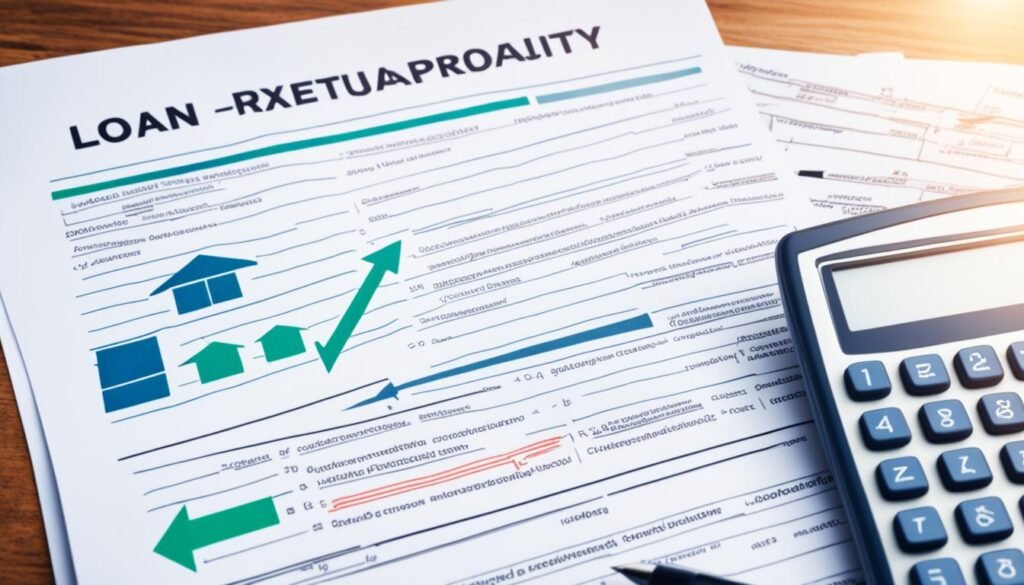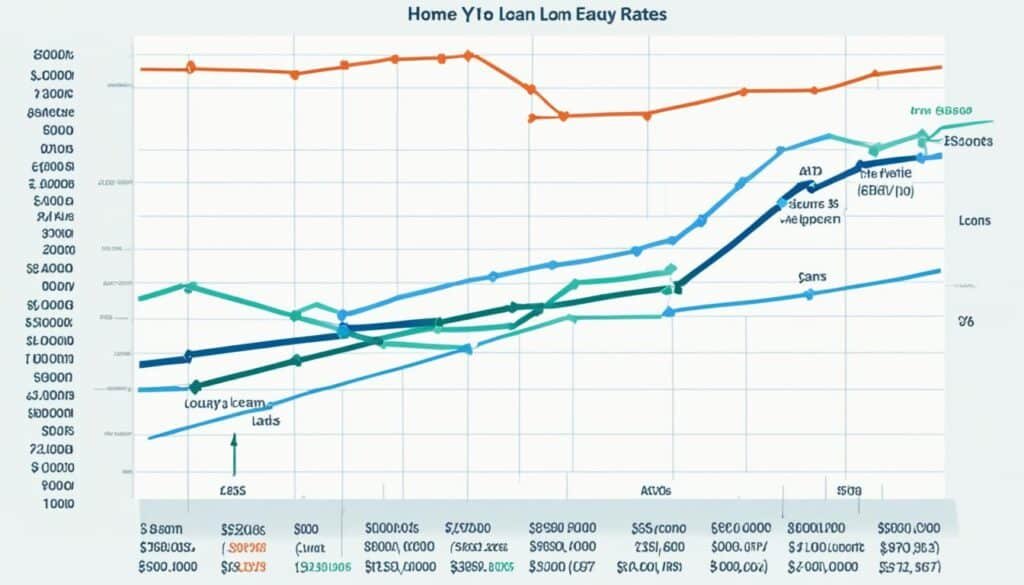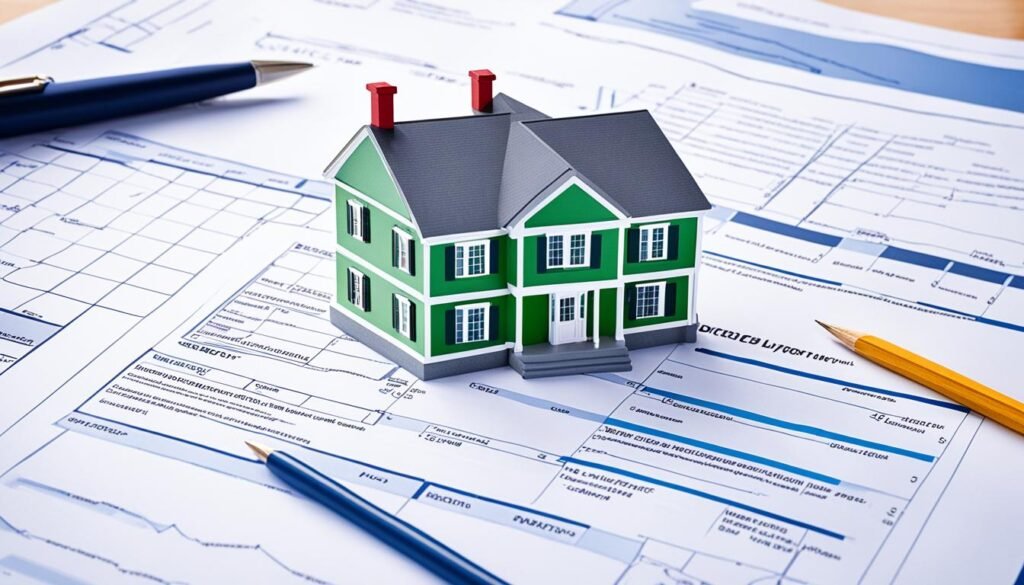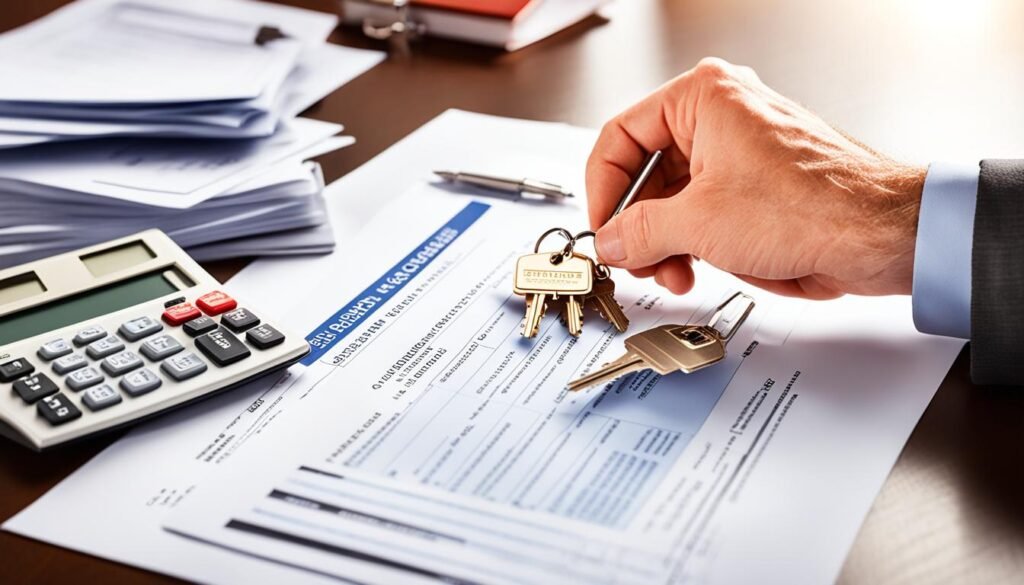Table of Contents
ToggleA Home Equity Loan Process lets homeowners borrow against their home equity. This means the market value of your house minus what you still owe. People use these loans for big projects like home improvements or to pay off student loans. They’re also great for combining and paying off high-interest debt.
The interest rates on home equity loans tend to be lower than personal loans or credit cards. Because they’re backed by your house, the rates are more favorable. Still, if you fall behind on payments, you could lose your home.
Key Takeaways
- A home equity loan allows homeowners to borrow against the equity in their home.
- Home equity loans are often used for large expenses like home improvements or debt consolidation.
- Home equity loan interest rates are typically lower than personal loans or credit cards.
- Failing to make payments on a home equity loan could result in foreclosure.
- Homeowners should carefully consider the risks and requirements before applying for a home equity loan.
What is a Home Equity Loan?
A home equity loan lets homeowners use the value of their home to get money. It’s the difference between what the house is worth and what you owe. Homeowners get a one-time sum that they pay back over 5 to 30 years.
Understanding Home Equity
The amount of your home’s equity affects how much you can borrow. If you’ve paid off more of your mortgage, you can borrow more. This money is helpful for big goals or combining debts.
Benefits and Drawbacks of Home Equity Loans
These loans usually have lower rates than personal loans or credit cards. They’re great for paying for home upgrades, college, or getting rid of debts. But, if you can’t pay, you could lose your home.
| Benefits of Home Equity Loans | Drawbacks of Home Equity Loans |
|---|---|
| Lower interest rates than personal loans or credit cards | Risk of foreclosure if loan payments are not made |
| Ability to use the funds for a variety of purposes | Using your home as collateral |
Home Equity Loan Requirements

To get a home equity loan, there are some important things you must do. You’ll need enough home equity, usually about 20% of your home’s worth. Lenders figure this out using the loan-to-value ratio (LTV) and combined loan-to-value ratio (CLTV) . This means the gap between what your home’s worth and what you owe must be large enough for the lender’s rules.
Sufficient Home Equity
Lenders like to see that you’ve set aside a lot of equity in your home. This is important because if you can’t pay back the loan, they might sell your home to get their money. Having more equity boosts your chances and can give you better loan terms.
Reasonable Debt-to-Income Ratio Home equity loan providers will also check your debt-to-income (DTI) ratio . It’s your monthly debt payments compared to your monthly income. A lower DTI is better as it shows you can manage your debts and pay the loan on time.
Good Credit Score
You need credit score of at least 620 to qualify for this kind of loan. A good credit score shows lenders you’re likely to pay back the loan as agreed. It also helps you get better rates and terms on the loan.
Financial Documentation
Lenders will ask for some papers to back up your financial health. They might need pay stubs, tax records, and bank statements. This helps them understand your income, assets, and how you manage your money.
Money for Closing Costs
Don’t forget about the closing costs
for your loan. They can take up 2% to 6% of the loan amount. These costs cover things like the appraisal, title check, starting the loan, and other processing fees.
If you follow these guidelines and have what you need, you’re on your way to a home equity loan. It also improves your chances of getting the best loan deal.
Home Equity Loan Rates

When you borrow against your home’s equity, the rates you get are key. These rates usually follow the prime rate. This is because such loans are seen as a bit more risky. They often have higher rates than regular home loans.
Factors Affecting Home Equity Loan Rates
Your rate on a home equity loan can be influenced by different things. These include your credit score and loan-to-value ratio. The market conditions and prime rate also play a big role. A high credit score and more equity in your home mean lower rates.
Fixed vs. Variable Rates
With home equity loans, you can pick from fixed or variable rates. Fixed rates don’t change, offering stable payments. Variable rates can go up or down over time, impacting what you pay. It’s important to think about your financial plans when choosing a rate type.
If you want a good deal on a home equity loan, looking around is vital. Explore what various lenders offer. Understand how fixed and variable rates work. This will help you choose wisely based on your financial situation and goals.
home equity loan process

The home equity loan process has several essential steps. It’s crucial for homeowners to think these through. Now, let’s explore the key stages and important points to consider.
Decide How Much Cash You Need
Deciding on the cash amount for a home equity loan is key. Unlike a HELOC, home equity loans offer a one-time withdrawal. Be careful not to borrow more than you need. Doing so might lead to a higher interest rate and total payment. Make sure to calculate your needs accurately to avoid financial strain.
Check Your Credit Score
Your credit score matters a lot in the loan process. A score of 700 or above is what most lenders like to see. This often means you’ll get a better interest rate and terms. If your score isn’t there yet, work on improving it before you apply. This could help you secure a great deal.
Compare Interest Rates and Lenders
After knowing how much you need and checking your credit score, it’s time to look at interest rates and lenders. It’s vital to shop around since rates and fees can vary. Don’t forget to look at closing costs and fees when comparing. Get offers from several lenders to find the best deal for you.
Complete Your Loan Application
Completing your loan application is the last step. You’ll need to give the lender some financial documentation like pay stubs and tax returns. This helps prove you can pay back the loan. Make sure your credit usage and financial state are well-documented.
Home Appraisal and Loan Approval

After applying for a home equity loan, the lender will look at your home’s value. They do this by ordering a property appraisal. It helps them decide your loan amount. They also check your financial health, like your credit score and work history, to see if you can pay back the loan.
When approved, you’re ready to close on the loan. This means everything was checked and the loan is good to go.
Property Appraisal Process
The home appraisal is a detailed process. An appraiser checks your home’s value based on the current market. They look into the loan-to-value ratio to see how much you can borrow.
Loan Underwriting and Approval
In the loan underwriting and approval phase, your finances are under the microscope. The lender verifies if you can afford the home equity loan. They consider your credit score, debt-to-income ratio, and work history. Once they’re sure you’re a good candidate, your loan will get the green light.
Closing on Your Home Equity Loan

When you close a home equity loan, it’s like closing on a primary mortgage. You sign the loan papers, pay any closing costs, then you get the money. Closing costs can be from 2% to 6% of the loan. These costs cover things like the appraisal, title search, and starting the loan process.
Reviewing Loan Documents
You’ll go over the loan papers carefully. It’s important to make sure you understand the amount you’re borrowing and the interest rate. This is when you can ask questions or clear up any confusing parts.
Paying Closing Costs
Before you get your loan, you must pay the closing costs. You can pay from the loan money or use your own. It depends on what your lender says.
Receiving Your Loan Funds
After everything is done, the lender gives you your money. You can spend it on making your home better, paying off debt, or whatever you need.
Using Your Home Equity Loan
Home equity loans help with many things like improving your house, paying for school, and combining debts. They usually have lower interest rates. This makes them a good choice for homeowners over some other loans.
Popular Uses for Home Equity Loans
A big reason people get a home equity loan is for home improvements. It’s great for updating the kitchen, adding a bathroom, or making your home more energy efficient. Another plus is you can use it to help pay off student loans. This can make your debt easier to manage, often at a lower interest rate.
Debt consolidation is another key use. It lets you pay off credit cards and other debts, which might save you money in the long run. This is because the interest rate on a home equity loan is often lower than what credit cards charge.
Managing Repayment
When you have a home equity loan, it’s vital to make your monthly payments on time. If you don’t, you might lose your house. It’s important to know that with each payment, you’re reducing both the interest and the amount you owe.
It’s crucial your payments are a good fit for your budget. Making sure you can repay the loan each month is essential. Otherwise, trying to pay too much might lead to the risk of losing your home.
Risks and Considerations
Home equity loans can give you a lot of money, but they also have risks. The big risk is losing your home through potential foreclosure if you can’t make the payments. Your house is used as a guarantee. So, not paying back the loan might lead to the bank taking your home. Also, your ability to borrow more money in the future might be hurt. This is because home equity loans can bad affect your credit history and how much money you owe. It’s important for homeowners to really think about if they can afford it before they get a home equity loan.
Foreclosure Risk
Borrowing against your home’s equity means you’re putting your home at risk. If you can’t pay the loan, the bank might take your home. It’s a serious risk that people must think about before getting this loan.
Impact on Future Borrowing
Getting a home equity loan could also hurt your chance of borrowing more money later on. This is because additional debt can lower your credit score and how much you owe compared to how much you make. That might make it hard to get other loans in the future. For example, getting a new mortgage or refinancing your current one might be tough.
Alternatives to Home Equity Loans
Home equity loans are a great way to use your home’s value for money. Yet, there are other options to think about. These other choices might be better for what you need or how you manage your finances.
Home Equity Line of Credit (HELOC)
A Home Equity Line of Credit (HELOC) is there when you need it. It’s not a one-time payout like a loan. Instead, you can borrow funds up to a certain limit as you go. You pay back what you borrow, plus interest. It’s good for ongoing financial needs.
Cash-Out Refinance
Cash-out refinance means getting a new, bigger mortgage. This is helpful if you need extra cash. Your new mortgage is bigger than the old one, and you get the difference in cash. It’s a way to update your mortgage and get money for big projects or bills.
Personal Loans
Personal loans are an option without using your home as a guarantee. They come with higher interest rates but no risk to your house. For some, this is a better choice to get money without putting their home on the line.
Each choice has its own good points and drawbacks. It’s smart to look at your own situation and needs before picking one.
Tips for Getting the Best Home Equity Loan
To get the best home equity loan, you need a smart plan. Homeowners should focus on key tips. This will help get good terms and a loan that works for your finances.
Improve Your Credit Score
Your credit score really matters for your loan’s terms. Aim for a score over 700 by paying bills on time and lowering credit card debt. Also, fix any mistakes on your credit report.
Shop Around for Rates
Don’t jump at the first loan offer you see. Shop around and compare rates from different lenders. This will help you get the best, competitive rates and ensure you’re not missing a better deal.
Consider Your Repayment Ability
Make sure you can comfortably handle the loan payments. Think about your budget and don’t overextend yourself. If you can’t keep up with payments, you could lose your home. Look at your expenses and future plans before you decide on a loan.
Conclusion
Home equity loans are a smart financial tool for homeowners to use. They let homeowners use the money they’ve built in their homes. But, before jumping in, it’s important to know the details.
Also Read : Unlocking Opportunities with Amex Small Business Loans
Homeowners should look at what they need and want carefully. They should check out other options, like HELOCs and personal loans, too. It’s also key to find a trustworthy lender.
When looking for a good home equity loan, check your credit and compare rates. Also, make sure you can handle the money you have to pay back. If you do it right, this loan can help you a lot.
The choice to get a home equity loan is big. Think about your goals and how much risk you’re okay with. By doing this, you can figure out if it’s a good fit for you.
FAQs
Q: How does the home equity loan process work?
A: To get a home equity loan, you need to borrow against the value of your home. You can apply for a home equity loan with a lender, who will evaluate the type of loan you qualify for based on your home value and equity. If approved, you will receive a lump sum amount of money with a fixed interest rate, which you can use for various purposes.
Q: What are the benefits of obtaining a home equity loan?
A: Obtaining a home equity loan allows you to tap into your home equity without having to sell your home. It can provide you with a large sum of money at a lower interest rate compared to other types of loans. Additionally, the interest on home equity loans may be tax-deductible in some cases.
Q: Can I get a home equity loan with bad credit?
A: While it may be more challenging, it is possible to borrow with a home equity loan even with bad credit. However, you may face higher interest rates and stricter terms compared to borrowers with higher credit scores.
Q: What is the difference between a home equity loan and a home equity line of credit (HELOC)?
A: A home equity loan is a type of loan that provides you with a lump sum of money upfront, while a HELOC allows you to borrow money as needed, similar to a credit card. With a home equity loan, you will have a fixed interest rate and monthly payments, whereas a HELOC offers more flexibility in borrowing and repayment.
Q: How do I find the best home equity loan rates?
A: To find the right loan for you, shop around with different home equity loan lenders to compare rates and terms. Factors such as your credit score, amount of equity, and the value of your home will impact the interest rates you are offered. Taking the time to research and compare options can help you secure the best rates available.
Q: What happens if I default on my home equity loan?
A: If you fail to make payments on your home equity loan, the lender may foreclose on your home to recover the borrowed amount. It’s essential to understand the risks involved in taking out a home equity loan and ensure you can meet the repayment terms to avoid defaulting.
Q: When is a home equity loan a good option for borrowing?
A: A home equity loan is a good option when you have a specific expense in mind, such as home renovations or debt consolidation, and you have enough equity in your home to borrow against. It can also be a beneficial choice if you prefer a fixed interest rate and predictable monthly payments.




